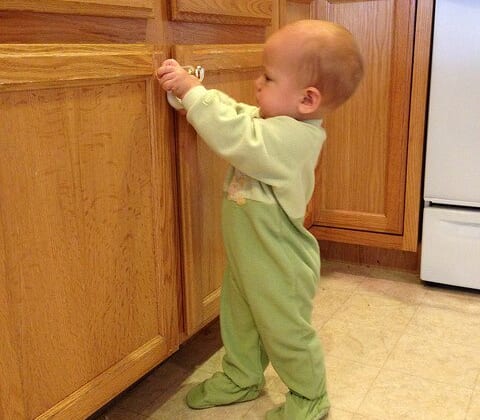Safe House: How to Childproof Your Home

Having children keeps me on my toes. I am one of those parents who is always checking up on the kids — it drives my wife crazy!
I have to admit this behavior of mine could drive anyone crazy. But can you blame me? I have spent most of my adult life in hospitals, and one of the most heartbreaking things I see is when a child is rushed into the emergency room with an accidental overdose or poisoning.
If you have children, one of the most fundamental things you must do is childproof your home. Of course, there is no such thing as a totally childproof home, but we have to try.
Toddlers and young children are curious creatures, and as their mobility increases, their exposure to the potential dangers of a home will increase as well. Life can’t be risk free, but most household accidents can be prevented if you follow this checklist for household safety.
Here are a few tips you can follow to make sure your home is as safe as possible for your child:
To Prevent Poisoning:
–Keep all medications–both prescription and nonprescription–as well as vitamins and supplements far from a child’s reach. –Do not leave any medications in your purse or pants pocket either; children may find them.
–Never tell a child that a medication tastes like “candy.”
–Keep household cleaning products, cosmetics and other toiletries, automotive and garden products, and other toxins in a high cabinet far from their reach.
–Do not leave alcoholic drinks and mouthwash, which contains alcohol, where children can reach them.
Lead Poisoning If you live in a house built before 1978 (the year the use of lead paint was banned), the paint on the walls of your home may present a serious threat to the central nervous systems of your child. The only solution is to move to a lead-free home or have the lead paint safely removed by certified lead contractors.
Carbon Monoxide Poisoning It is also important you have a carbon monoxide monitor in the house. There are hundreds of fatalities due to carbon monoxide every year. It is the most toxic substance you’ll come into contact with during your daily life, yet you can’t see it, smell it or taste it. It is caused by gas appliances and fossil fuels, including oil, coal and wood.
To Prevent Burns: Burns are among the most common of childhood accidents. To avoid them:
–Set the thermostat on your hot water heater to 120 degrees F or lower. If you cannot control the hot water temperature in your home, install an anti-scald device on your faucets. –Do not use tablecloths or large placemats, as small children can pull on them, possibly overturning a hot drink or hot plate of food.
–Always turn pot and pan handles toward the back of the stove, out of a child’s reach.
–Always make sure you have a functioning fire alarm in the house.
To Prevent Strangulation:
–Tie up window blind cords so they are out of your child’s reach.
–Cut cords so there is no loop at the bottom
–Don’t put necklaces or headbands on your baby.
–Never tie a pacifier around your baby’s neck.
To Prevent Firearm Injuries: Accidental shootings take the lives of 250 children aged 14 and under in the U.S. each year.
–Do not keep guns at home. –Avoid exposing your children to households where guns are kept.
–If you must keep a gun at home, store it in a securely locked case, out of a child’s reach, and keep the ammunition in a separate locked location.
To Prevent Injuries From Falls:
–Install safety bars on high windows, and keep such windows closed and locked.
–Apply non-skid strips to the bottoms of bathtubs.
To Prevent Electric Shock:
–Cover all unused electrical outlets, which are usually at a toddler’s eye level, with safety caps.
–Unplug all kitchen or bathroom appliances that are not being used.
–Bind excess cord length from lamps and other electrical devices with a twist tie to prevent chewing on cords.
To Prevent Drowning:
–Never leave a baby unattended in the bath. An infant can drown in only a few inches of water.
–Never leave children unattended by a swimming pool, wading pool or hot tub. Water wings, inflatable rings and other floatation devices are not a substitute for constant adult supervision.
–Dump water out of wading pools when not in use.
To Prevent Cuts:
–Keep knives, forks, scissors, shaving razors, saws and other sharp tools in a drawer with a safety latch or in a high cabinet.
–Keep glass drinking glasses or dishware from a child’s reach
To Prevent Animal Bites:
–Do not leave children less than a year old alone with the family dog, cat or other pet.
–Until the age of four, children should be supervised when playing with a pet.
–Teach your children never to tease an animal or to take food away from a dog.
